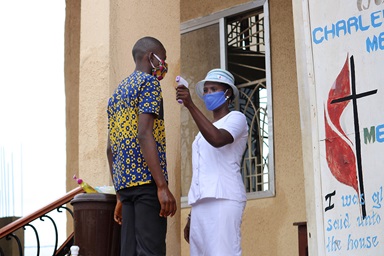Methodist Health System in Dallas will provide space for a state-of-the-art Ebola treatment and infectious disease biocontainment facility in North Texas.
One floor of the system’s Methodist Campus for Continuing Care, in Richardson, Texas, just north of Dallas, will be available if needed.
“Methodist Health System answered the call because it is the right thing to do,” said Stephen L. Mansfield, president and CEO, Methodist Health System. “Like all North Texans, we wish we weren’t in this situation. But the reality is there remains a threat, and as long as it’s there, Methodist is obligated by our mission — to improve and save lives through compassionate, quality health care — to do all we can to help.”
Dallas found itself at the center of Ebola-related anxiety in the United States after Thomas Eric Duncan of Liberia was admitted to Texas Health Presbyterian Hospital Dallas and diagnosed with the disease — the first such diagnosis in the United States.
Duncan died Oct 8. Two of the nurses who cared for him have been diagnosed with Ebola. Others who had contact with him were placed under quarantine for 21 days. As of Oct. 20, the quarantine of 43 of 48 people on the original watch list had ended.
Teas Gov. Rick Perry held a press conference Tuesday, announcing that Methodist, UT Southwestern Medical Center and Parkland Hospital System will work together to set up and operate the unit at Methodist Campus for Continuing Care.
UT Southwestern Medical Center, affiliated with the University of Texas, is contributing physicians experienced in infectious disease, critical care and other specialties, and some nursing professionals as staffing requires.
Parkland Hospital has begun moving critical equipment such as personal protective equipment, IV fluids and laboratory supplies to Methodist Campus for Continuing Care. Parkland will provide nurses, pharmacists, respiratory therapists and lab technicians.
Methodist will provide some modifications for decontamination, laboratory equipment and other dedicated personnel for IT and biomedical support.
“In the event of another diagnosis, this facility will allow us to act quickly to limit the virus’s reach and give patients the care they need in an environment where health care workers are specially trained and equipped to deal with the unique requirements of this disease,” Perry said.
The University of Texas Medical Branch at Galveston also has been designated an Ebola treatment and infectious disease biocontainment facility.
Methodist Health System said its Methodist Campus for Continuing Care was chosen because it’s easily adaptable and has a recently vacated intensive care unit and an emergency department — both essential assets in the treatment of infectious diseases.
“Our hope is that the facility will not be needed for this purpose, but until the current threat has passed, Methodist stands firmly committed with its coalition partners to meet the health care needs of the community it serves and to protect the health, safety, and welfare of patients, health care providers, and our fellow North Texans,” Methodist Health System said in a press release.
The creation of special facilities for Ebola treatment was recommended by the governor’s recently named Texas Task Force on Infectious Disease Preparedness and Response.
Dallas Methodist Hospital opened in 1927, the realized dream of Methodist ministers and civil leaders. That sole hospital has evolved into Methodist Health System, which has facilities across the Dallas area and employs more than 7,500.
The system maintains a covenant relationship with the North Texas Conference of The United Methodist Church, and United Methodist clergy and laity serve on the system’s governing boards.
Hodges, a United Methodist News Service writer, lives in Dallas. Contact him at (615) 742-5470 or [email protected]
Like what you're reading? Support the ministry of UM News! Your support ensures the latest denominational news, dynamic stories and informative articles will continue to connect our global community. Make a tax-deductible donation at ResourceUMC.org/GiveUMCom.




